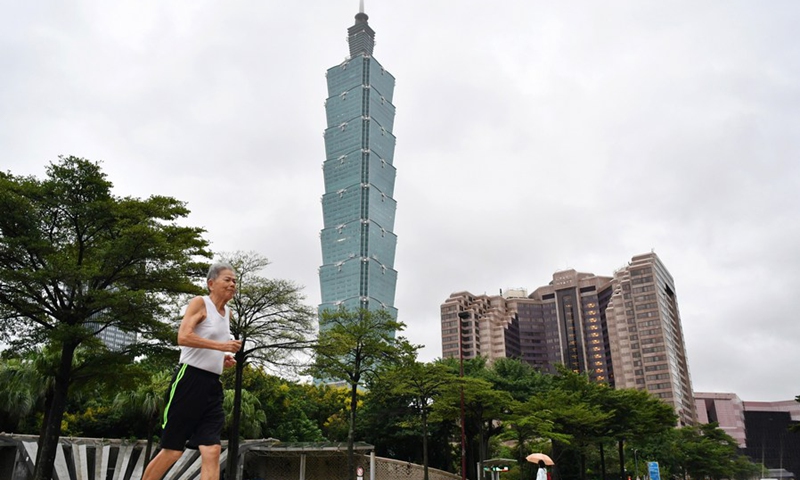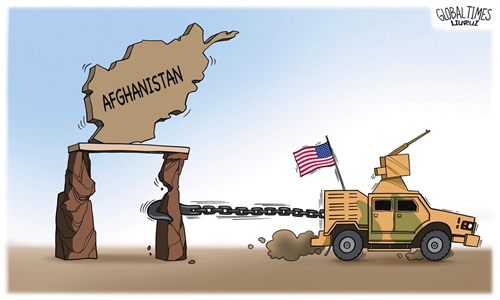
A citizen runs in front of the Taipei 101 skyscraper in Taipei, southeast China's Taiwan, on Oct. 1, 2019.(Photo: Xinhua)
The US' hasty and chaotic withdrawal from Afghanistan has triggered discussions over whether Washington would abandon its commitment to the island of Taiwan.
Earlier, US National Security Advisor Jake Sullivan said, "When it comes to Taiwan, it is a fundamentally different question in a different context," and the US' "commitment" to Taiwan remains "as strong as it's ever been." Taiwan's regional leader Tsai Ing-wen also declared that the island's only option is to make itself stronger, more united and more determined to defend itself.
The rapid defeat of the US-backed Afghan forces was beyond the expectation of Washington. But regarding the island of Taiwan, Washington does not have a high assessment of the combat ability or will of the island to fight. It does not believe in Taiwan's ability to safeguard itself either. The US has observed Taiwan's military drills. In the eyes of the US, Taiwan's drills were merely shows and not about actual combat abilities.
The US commitment to Taiwan mainly hangs on the Taiwan Relations Act, the Six Assurances, and some verbal promises from a few US politicians. None of the legal documents commits the US to defending the island of Taiwan in a military clash. Some believe Taiwan needs to defend itself in order to inspire the US to commit. This reflects the dilemma of both Taiwan island and the US.
On the one hand, Washington does not want to make an explicit commitment to Taiwan, because it will make Taiwan think that it does not need to defend itself and it could simply rely on the US. But if Taiwan relies too much on the US, it shows Taiwan's lack of the ability to defend itself, which Taiwan is unwilling to admit. The absence of a clear US commitment to Taiwan signals the low trust between the two sides.
The Chinese mainland has kept enhancing its combat ability and its preparedness for war. It has the unwavering determination to safeguard its sovereignty.
But for Taiwan's military forces, a difficult question for them is: For whom do they fight? Are they fighting for Taiwan secessionists or for a certain, far-away country? The "Constitution" of Taiwan island does not demand they fight for secession, or for the US.
The island of Taiwan is fully aware that the fall of the Kabul regime shows that Washington cannot be trusted. When the US cut "diplomatic" ties with the island of Taiwan in 1979, such abandonment was much more serious than what happened with Afghanistan right now. As the international landscape changes, Washington has turned again to Taiwan, using the island as a ready card to contain China.
Some in Taiwan mistakenly believe the island's strategic status is important. It is worth pointing out that Afghanistan's strategic importance is no less than that of Taiwan. Taiwan is only one card in the eyes of the US. But Afghanistan was one card for multiple usages.
The situation in Afghanistan can affect China to its east, Russia to its north, and the Middle East to its west. After 20 years of struggling in Afghanistan, the US has not achieved its intended goals - it has failed to contain either China or Russia, and its clout in the Middle East is declining.
Therefore, after careful calculation, the US believed it was not a cost-effective deal, so it made hastened retreat from Afghanistan. Similarly, the US will probably make a strategic decision to Taiwan that only suits its own interests, particularly when Taiwan's strategic value wanes while the US finds it too hard to decouple with China due to economic and trade relations. After all, the US uses the island of Taiwan only as long as it can affect China's development.
The author is a Beijing-based naval expert and a retired PLA Navy officer. opinion@globaltimes.com.cn

